Week in Freethought History (June 24-30)
Here’s your Week in Freethought History: This is more than just a calendar of events or mini-biographies – it’s a reminder that, no matter how isolated and alone we may feel at times, we as freethinkers are neither unique nor alone in the world.
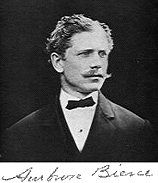 Last Sunday, June 24, but in 1842, journalist and social critic Ambrose Bierce was born. After serving in the Union Army in the American Civil War, Bierce published his first short story in 1871, already mining the macabre and spicing it with satire. Twenty years later saw Bierce's most famous short story, the hauntingly twisted “Occurrence at Owl Creek Bridge” – which was adapted into an episode of the TV series “Twilight Zone” in 1962. The world of which Bierce writes is not only an ironically cruel one, but also a godless one: in the 1912 edition of his Collected Works, Bierce wrote, “Religions are conclusions for which the facts of nature supply no major premises.” His most famous satirical work, The Devil’s Dictionary, is a collection of sardonic epigrams, such as,
Last Sunday, June 24, but in 1842, journalist and social critic Ambrose Bierce was born. After serving in the Union Army in the American Civil War, Bierce published his first short story in 1871, already mining the macabre and spicing it with satire. Twenty years later saw Bierce's most famous short story, the hauntingly twisted “Occurrence at Owl Creek Bridge” – which was adapted into an episode of the TV series “Twilight Zone” in 1962. The world of which Bierce writes is not only an ironically cruel one, but also a godless one: in the 1912 edition of his Collected Works, Bierce wrote, “Religions are conclusions for which the facts of nature supply no major premises.” His most famous satirical work, The Devil’s Dictionary, is a collection of sardonic epigrams, such as,
CHRISTIAN, One who believes that the New Testament is a divinely inspired book admirably suited to the spiritual needs of his neighbor. One who follows the teachings of Christ in so far as they are not inconsistent with a life of sin.
INFIDEL, In New York, one who does not believe in the Christian religion; in Constantinople, one who does.
PRAY, To ask that the laws of the universe be annulled in behalf of a single petitioner confessedly unworthy.
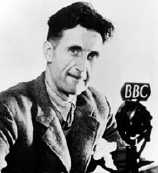 Last Monday, June 25, but in 1903, the famous political satirist George Orwell was born Eric Arthur Blair. Orwell's fame rests largely on two books he published in the 1940s: a devastating satire of Stalinism called Animal Farm (1945), played out with beasts on a farm, where the pigs rule, and featuring a raven named Moses who describes to the animal masses a great mountain in the sky, called Sugar Candy Mountain, that all would go to when they died. The other famous Orwell satire was 1984 (1949), featuring a future totalitarian bureaucracy overseen by “Big Brother” who appears only in pictures and descriptions, never in real life. It is this novel that comes closest to a critique of God. It is because of 1984 that we have come to use the sinister adjective, “Orwellian.” You might think from his satire of Stalinism that George Orwell was an Ayn Rand follower, but he came closer to idealistic Socialism, while maintaining a deep skepticism of religion: “In theory it is still possible to be an orthodox religious believer without being intellectually crippled in the process,” he wrote, “but it is far from easy, and in practice books by orthodox believers usually show the same cramped, blinkered outlook as books by orthodox Stalinists or others who are mentally unfree. The reason is that the Christian churches still demand assent to doctrines which no one seriously believes in.”
Last Monday, June 25, but in 1903, the famous political satirist George Orwell was born Eric Arthur Blair. Orwell's fame rests largely on two books he published in the 1940s: a devastating satire of Stalinism called Animal Farm (1945), played out with beasts on a farm, where the pigs rule, and featuring a raven named Moses who describes to the animal masses a great mountain in the sky, called Sugar Candy Mountain, that all would go to when they died. The other famous Orwell satire was 1984 (1949), featuring a future totalitarian bureaucracy overseen by “Big Brother” who appears only in pictures and descriptions, never in real life. It is this novel that comes closest to a critique of God. It is because of 1984 that we have come to use the sinister adjective, “Orwellian.” You might think from his satire of Stalinism that George Orwell was an Ayn Rand follower, but he came closer to idealistic Socialism, while maintaining a deep skepticism of religion: “In theory it is still possible to be an orthodox religious believer without being intellectually crippled in the process,” he wrote, “but it is far from easy, and in practice books by orthodox believers usually show the same cramped, blinkered outlook as books by orthodox Stalinists or others who are mentally unfree. The reason is that the Christian churches still demand assent to doctrines which no one seriously believes in.”
 Also born on June 25, former evangelist preacher and current co-president of the Freedom From Religion Foundation, Dan Barker in 1949, who wrote is his 1992 autobiography, Losing Faith in Faith: From Preacher to Atheist, “For my money, I'll bet on reason and humanistic kindness. Even if I am wrong I will have enjoyed my life, the existence of which is under little dispute.”
Also born on June 25, former evangelist preacher and current co-president of the Freedom From Religion Foundation, Dan Barker in 1949, who wrote is his 1992 autobiography, Losing Faith in Faith: From Preacher to Atheist, “For my money, I'll bet on reason and humanistic kindness. Even if I am wrong I will have enjoyed my life, the existence of which is under little dispute.”
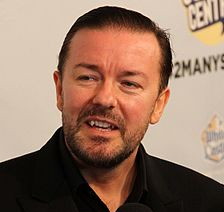 Also born on June 25, English comedian Ricky Gervais in 1961, who said in a 2008 interview, “Wow. No God. If Mum had lied to me about God, had she also lied to me about Santa? Yes, but who cares? The gifts kept coming. And so did the gifts of my newfound atheism. The gifts of truth, science, nature.”
Also born on June 25, English comedian Ricky Gervais in 1961, who said in a 2008 interview, “Wow. No God. If Mum had lied to me about God, had she also lied to me about Santa? Yes, but who cares? The gifts kept coming. And so did the gifts of my newfound atheism. The gifts of truth, science, nature.”
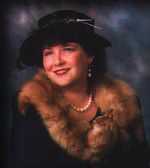 Last Tuesday, June 26, but in 1892, American novelist Pearl S. Buck, was born. Her novels – especially The Good Earth (1931), which won her the 1938 Nobel Prize in Literature – focused on life in China and the culture clash between East and West. All her writings show a nontheistic humanism. As Buck said, “I am so absorbed in the wonder of earth and the life upon it that I cannot think of heaven and the angels. I have enough for this life,” and “I feel no need for any other faith than my faith in human beings.”
Last Tuesday, June 26, but in 1892, American novelist Pearl S. Buck, was born. Her novels – especially The Good Earth (1931), which won her the 1938 Nobel Prize in Literature – focused on life in China and the culture clash between East and West. All her writings show a nontheistic humanism. As Buck said, “I am so absorbed in the wonder of earth and the life upon it that I cannot think of heaven and the angels. I have enough for this life,” and “I feel no need for any other faith than my faith in human beings.”
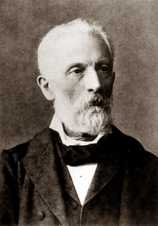 Also born last Tuesday, June 26, but in 1826, was the anthropologist and pioneer ethnologist Adolf Bastian. In 1860, Bastian published Man in History, a study in which he proposed a theory of cultural evolution which anticipates, and may have sparked, Carl Jung's idea of the collective unconscious. Man in History is shot through with passages testifying to Bastian's Agnosticism. Speaking of science as foe and God as protector, in volume one he says, "we no longer fear when a mighty foe shakes our protector from his heaven, to sink with him into an abyss of annihilation."
Also born last Tuesday, June 26, but in 1826, was the anthropologist and pioneer ethnologist Adolf Bastian. In 1860, Bastian published Man in History, a study in which he proposed a theory of cultural evolution which anticipates, and may have sparked, Carl Jung's idea of the collective unconscious. Man in History is shot through with passages testifying to Bastian's Agnosticism. Speaking of science as foe and God as protector, in volume one he says, "we no longer fear when a mighty foe shakes our protector from his heaven, to sink with him into an abyss of annihilation."
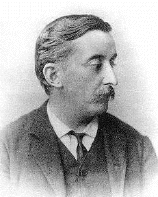 Last Wednesday, June 27, but in 1850, the international writer, best known for his books about Japan, Lafcadio Hearn was born. While attending St. Cuthbert's in England, Hearn shook off his Catholicism and adopted a Pantheism little removed from Atheism. Between 1889 and 1890, during the Meiji period, he settled in Japan, where he spent the rest of his life. He taught English and literature but was particularly adept at interpreting Japanese Buddhism as a way of life rather than as a belief. In this he found a perfect complement to his own lack of religion. He never became a Buddhist, and disagreed with some of its principles, but, as Kenneth Rexroth wrote (1977) Hearn “passionately believed that Buddhism promoted a far better attitude toward daily life than did Christianity.”
Last Wednesday, June 27, but in 1850, the international writer, best known for his books about Japan, Lafcadio Hearn was born. While attending St. Cuthbert's in England, Hearn shook off his Catholicism and adopted a Pantheism little removed from Atheism. Between 1889 and 1890, during the Meiji period, he settled in Japan, where he spent the rest of his life. He taught English and literature but was particularly adept at interpreting Japanese Buddhism as a way of life rather than as a belief. In this he found a perfect complement to his own lack of religion. He never became a Buddhist, and disagreed with some of its principles, but, as Kenneth Rexroth wrote (1977) Hearn “passionately believed that Buddhism promoted a far better attitude toward daily life than did Christianity.”
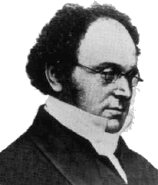 Also born last Wednesday, June 27, but in 1806, was English mathematician and logician Augustus De Morgan. De Morgan strongly objected to the theological test required for the MA at Trinity College, Cambridge, so his formal education ended there. For the same reason, he also rejected his parents' wish that he become a priest. Augustus de Morgan was a Theist with an ethical appreciation of Christianity. He described himself as an "unattached Christian," and refused to join even the Unitarian Church.
Also born last Wednesday, June 27, but in 1806, was English mathematician and logician Augustus De Morgan. De Morgan strongly objected to the theological test required for the MA at Trinity College, Cambridge, so his formal education ended there. For the same reason, he also rejected his parents' wish that he become a priest. Augustus de Morgan was a Theist with an ethical appreciation of Christianity. He described himself as an "unattached Christian," and refused to join even the Unitarian Church.
Last Thursday, June 28, marks the birth of three famous freethinkers—
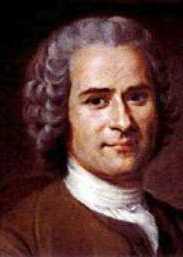 On June 28, 1712, French writer Jean-Jacques Rousseau was born. While in pre-Revolutionary Paris, he associated with Denis Diderot, who introduced him to Jean d'Alembert, Baron d'Holbach, Madame d'Epinay and the other resident Rationalists and Encyclopedists, including Voltaire. At age 50, Rousseau published his most notable work, On the Social Contract (1762), in which he writes, “Man is born free, and everywhere he is in chains.” Although he was expelled from both Paris and Geneva for “irreligion.” in Émile (1762), which urges educational reform, Rousseau demonstrated that he was a Deist, saying, “The Supreme Being is best displayed by the fixed and unalterable order of nature. If there should happen many exceptions to such general laws, I should no longer know what to think; and for my part, I must confess I believe too much in God to believe in so many miracles so little worthy of him.”
On June 28, 1712, French writer Jean-Jacques Rousseau was born. While in pre-Revolutionary Paris, he associated with Denis Diderot, who introduced him to Jean d'Alembert, Baron d'Holbach, Madame d'Epinay and the other resident Rationalists and Encyclopedists, including Voltaire. At age 50, Rousseau published his most notable work, On the Social Contract (1762), in which he writes, “Man is born free, and everywhere he is in chains.” Although he was expelled from both Paris and Geneva for “irreligion.” in Émile (1762), which urges educational reform, Rousseau demonstrated that he was a Deist, saying, “The Supreme Being is best displayed by the fixed and unalterable order of nature. If there should happen many exceptions to such general laws, I should no longer know what to think; and for my part, I must confess I believe too much in God to believe in so many miracles so little worthy of him.”
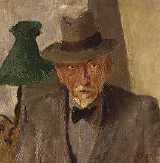 On June 28, 1867, Italian playwright Luigi Pirandello was born. In his most famous play, Six Characters in Search of an Author (1921), Pirandello's characters rebel against their creator, attack the foundation of the play, refuse to follow stage directions and interfere with the structure of the play until it breaks down. One critic said of his works that Pirandello's “conception of reality is the exact opposite to the religious.” And a biographer grudgingly admits, “God is too absent from his work, and there is no trace of the wonderful balm of mysticism.” As Pirandello wrote in Six Characters, “A man will die, a writer, the instrument of creation: but what he has created will never die! And to be able to live for ever you don't need to have extraordinary gifts or be able to do miracles.”
On June 28, 1867, Italian playwright Luigi Pirandello was born. In his most famous play, Six Characters in Search of an Author (1921), Pirandello's characters rebel against their creator, attack the foundation of the play, refuse to follow stage directions and interfere with the structure of the play until it breaks down. One critic said of his works that Pirandello's “conception of reality is the exact opposite to the religious.” And a biographer grudgingly admits, “God is too absent from his work, and there is no trace of the wonderful balm of mysticism.” As Pirandello wrote in Six Characters, “A man will die, a writer, the instrument of creation: but what he has created will never die! And to be able to live for ever you don't need to have extraordinary gifts or be able to do miracles.”
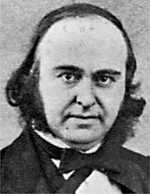 And on June 28, 1824, French anthropologist Pierre Paul Broca was born. Broca's chief contribution to brain anatomy, based on observations of patients with brain damage who were unable to talk, was the discovery of the location in the brain of the speech center, which has become known as Broca's area. Because he was sympathetic to Darwin's theory of natural selection – saying, “I would rather be a transformed ape than a degenerate son of Adam” – Broca was accused by the Catholic Church of being a rebellious person, a materialist, and a corrupter of youth. Broca has been described as a Christian, but he must have practiced it lightly, because he founded a society for free-thinkers in 1848. Indeed, he had little patience for superstition, saying, “Greedy for explanations, and rather than being satisfied with ignorance, the human mind treats itself to words devoid of meaning, like those American savages who in time of famine swallow clay to silence their empty stomachs.”
And on June 28, 1824, French anthropologist Pierre Paul Broca was born. Broca's chief contribution to brain anatomy, based on observations of patients with brain damage who were unable to talk, was the discovery of the location in the brain of the speech center, which has become known as Broca's area. Because he was sympathetic to Darwin's theory of natural selection – saying, “I would rather be a transformed ape than a degenerate son of Adam” – Broca was accused by the Catholic Church of being a rebellious person, a materialist, and a corrupter of youth. Broca has been described as a Christian, but he must have practiced it lightly, because he founded a society for free-thinkers in 1848. Indeed, he had little patience for superstition, saying, “Greedy for explanations, and rather than being satisfied with ignorance, the human mind treats itself to words devoid of meaning, like those American savages who in time of famine swallow clay to silence their empty stomachs.”
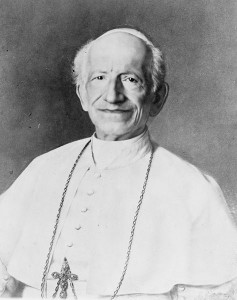 Finally, it was on today’s date, June 30, 1909, that the Pontifical Biblical Commission, which had been formed by Leo XIII (Pope 1878-1903) seven years earlier, decreed that the first 11 chapters of the biblical book of Genesis must be interpreted by Catholics as history, not as mythology. As in ages past, this meant that Catholics were compelled to accept as genuine history the childish and derivative stories of the Creation, the Garden of Eden, the Fall, the Flood, and the confusion of languages at Babel. In the creation, the earth is formed before light and stars, birds and whales before reptiles and insects, and flowering plants before animals. Science tells us the true order of events was just the opposite. The flood covered the highest mountains, but there is no explanation of where the water came from, where it went, or why there is no geological record of it. In the Babel story, humans separated into groups on the basis of their language, but historical linguists will tell you that languages evolve within groups already separated. The Pontifical Biblical Commission ratified the prescription of its founder, Leo XIII, who said, “All the books which the Church received as sacred and canonical were written wholly and entirely, with all their parts, at the dictation of the Holy Ghost. It is impossible, therefore, that any error can co-exist with divine inspiration.” So there it is!
Finally, it was on today’s date, June 30, 1909, that the Pontifical Biblical Commission, which had been formed by Leo XIII (Pope 1878-1903) seven years earlier, decreed that the first 11 chapters of the biblical book of Genesis must be interpreted by Catholics as history, not as mythology. As in ages past, this meant that Catholics were compelled to accept as genuine history the childish and derivative stories of the Creation, the Garden of Eden, the Fall, the Flood, and the confusion of languages at Babel. In the creation, the earth is formed before light and stars, birds and whales before reptiles and insects, and flowering plants before animals. Science tells us the true order of events was just the opposite. The flood covered the highest mountains, but there is no explanation of where the water came from, where it went, or why there is no geological record of it. In the Babel story, humans separated into groups on the basis of their language, but historical linguists will tell you that languages evolve within groups already separated. The Pontifical Biblical Commission ratified the prescription of its founder, Leo XIII, who said, “All the books which the Church received as sacred and canonical were written wholly and entirely, with all their parts, at the dictation of the Holy Ghost. It is impossible, therefore, that any error can co-exist with divine inspiration.” So there it is!
We can look back, but the Golden Age of Freethought is now. You can find full versions of these pages in Freethought history at the links in my blog, FreethoughtAlmanac.com.

